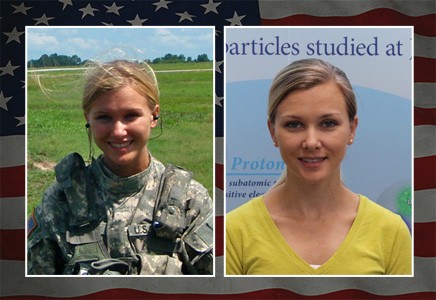Holly Szumila-Vance served as an Aeromedical Evacuation Pilot on UH-60 Blackhawk helicopters and as a Platoon Leader in the Army from 2006 to 2013. She started her career at Jefferson Lab in 2013 and now works as a Hall C Postdoctoral Research Associate.
"I was fortunate to work with a variety of people from different backgrounds towards a common cause," said Szumila-Vance. "I think it was remarkable how, regardless of our differences, we would all unite as a team over an urgent medical request without overstepping each other."
Q&A with Holly Szumila-Vance, U.S. Army
What did you do for the military?
I was an aeromedical evacuation pilot and platoon leader. This means I flew UH-60 Blackhawk helicopters that carried medical personnel who could provide aid to those we transported. For high priority rescue missions we had to launch within 15 minutes to get to someone to save life, limb, or eyesight.
What made you decide to join the military?
I joined the military to serve my country and give back to my community.
Why did you choose the branch of service that you did?
I chose the Army because I was able to join the National Guard where I could continue with my university studies while flying helicopters and drilling on the weekends.
What was your favorite part of the job?
I liked the people I worked with, and I loved flying and providing aid to those who needed it.
What was your most interesting/favorite deployment or duty station and why?
I deployed to the Helmand Province in southern Afghanistan in 2011-2012. We supported all friendly forces, which were primarily composed of the U.S. Marines and Afghans at that time. I felt the mission was really important and humbling. Ground forces rely on us when performing their missions, and they will not conduct operations without us standing by. Friendly forces knew they could depend on us in a medical combat emergency, and we knew we could depend on them for ground protection so that we could safely evacuate their companions. When receiving urgent calls, we pushed our aircraft and flight crews to their limits to evacuate our patients. Occasionally our evacuations required us to fly in deteriorating weather conditions or high threat areas. It was very fulfilling to know my role in the bigger picture and to provide life-saving aid to our friendly forces when others could not.
What skills did you develop that you use now after your military career?
When I was deployed, I often had to make critical decisions with limited information. Today, I think we've become accustomed to having any information we want at our finger tips, however, when it's not available we are still able to move forward using the limited information we do have. I was also fortunate to work with a variety of people from different backgrounds towards a common cause. I think it was remarkable how, regardless of our differences, we would all unite as a team over an urgent medical request without overstepping each other. Today, we use a lot of those same teamwork traits on a daily basis as we're all working toward similar goals here at the lab in better understanding nuclei!
The regional home of Jefferson Lab, Hampton Roads, has a rich military history. Located in Southeastern Virginia, the region is currently home to more than 80,000 men and women in uniform, representing every branch of the armed forces. Throughout November 2018, Jefferson Lab is celebrating the region's military ties by highlighting some of our veteran employees who have served in the armed forces and who continue to serve their nation by supporting the research efforts carried out at the laboratory.


